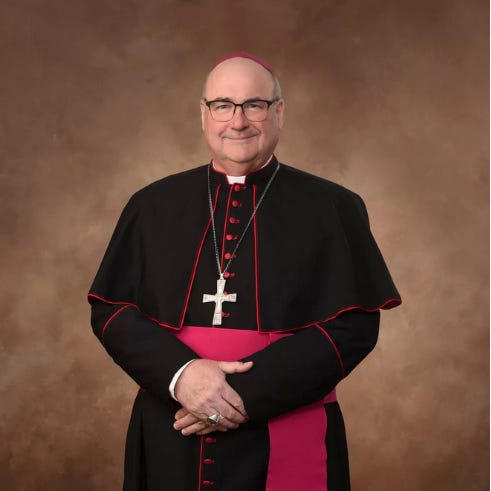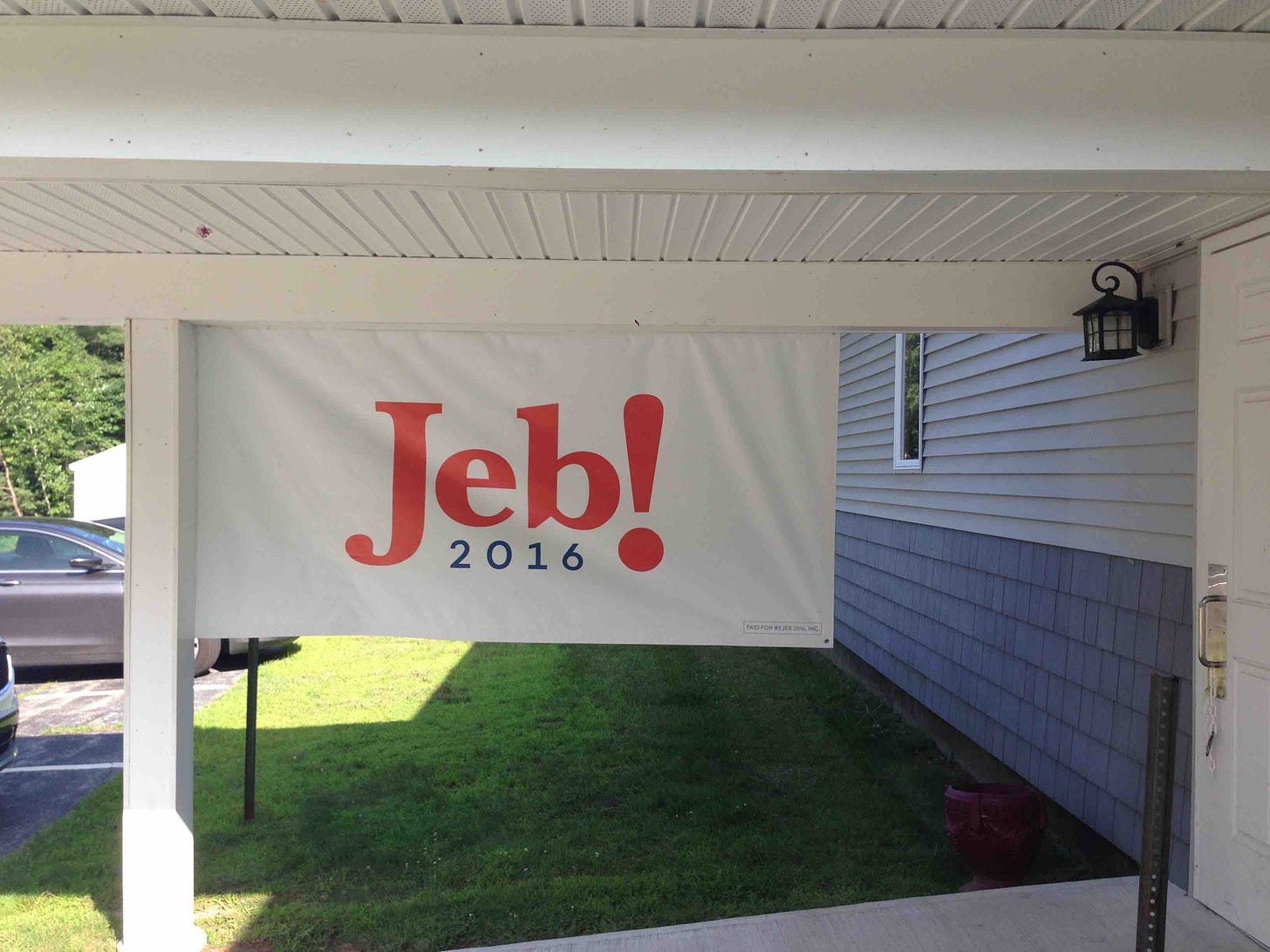Jeb Bush Takes Helm of Group Countering Iran
Plus, new archbishop-elect of Boston begins with a prayer for the press; stock market
The former governor of Florida, Jeb Bush, is taking over as the chairman of United Against Nuclear Iran, an education and advocacy group that had been led by Senator Joseph Lieberman of Connecticut, who died in March.
In Bush’s first day on the job, he issued a public message in Farsi, promising the people of Iran, “we will expand all our activities more firmly and with more motivation, with the aim of fighting against Khamenei, the terrorist Revolutionary Guard Corps, and supporting your vision for a free Iran. We are with you and do not doubt that victory is near.”
In English, Bush offered a similar message of solidarity with the Iranian people against the regime. “The Islamic Republic is a threat not only to the United States but also to the brave Iranian people,” Bush said in a statement. “They deserve better than repressive rulers and U.S. leadership that has been adrift. Getting U.S. Iran policy right requires a bipartisan approach—bridging divides between Democrats and Republicans. It will be the only way for the United States to form a durable and long-term strategy. I hope to contribute to this effort at UANI and to build on Senator Lieberman’s important work as chairman.”
There are a lot of players on U.S.-Iran policy other than United Against Nuclear Iran, a small nonprofit group. Bush, a Republican who is the son of President George H.W. Bush and the brother of President George W. Bush, may not be the most effective spokesman with either a Trump-Vance administration or a Harris administration. Bush ran a well-funded but losing campaign against Trump for the Republican presidential nomination in 2016.
Yet even so, it’s an intriguing and potentially significant move. Bush has a high public profile, fundraising skill, and a reputation that might help get thing done on Capitol Hill. That could be especially important in an environment where, no matter who wins the presidency, Congress may wind up taking the lead when it comes to countering Iran and, more broadly, promoting freedom and democracy abroad as a focus of national security policy.
I’ve watched Bush in action both on the campaign trail in New Hampshire and in the education policy context, where he’s been active in building a network. He’s a strong player, and this is a nice opportunity for him to have an impact.
With Israel on edge and Iran funding Hamas, Hezbollah, and the Houthis while seeking a nuclear weapon and contributing to global economic turmoil, it’s certainly a high-profile moment for Iran policy. Senators Cruz, Cotton, Scott, and Rubio are notable Iran hawks; so was Senator Menendez. With the elements of the Republican and Democratic parties flirting with isolationism or with negotiated agreements that would leave the Iranian regime in place, Bush has an opportunity to define an alternative approach that, if successful, could potentially provide useful experience for also dealing with Russia or Communist China.
Sometimes organizations like United Against Nuclear Iran go out of business when a key figure like Lieberman dies. Everyone—Iranians, Americans, Saudis, Israelis, Emeratis—with an interest in avoiding a nuclear-armed Iranian regime should be glad that Jeb Bush is stepping up to this task and wish him great success.
A new archbishop for Boston: If the stock market or the Middle East wars or the American political landscape have you discouraged, take a few minutes and watch the Archdiocese of Boston’s press conference introducing Richard Henning, the Bishop of Providence, Rhode Island, who will take over October 31 from Cardinal Sean O’Malley as archbishop of Boston.
What a hopeful event, from start to finish.
O’Malley began in part by quoting Pope Francis defining a priest as “someone who transmits hope to restless hearts.” He described Henning as “a joyful pastor who seeks to serve Christ and his people.” O’Malley said “despite all the challenges that we have”—he named “the secularization of the culture,” the sexual abuse scandals—he is “filled with hope.”
Henning prefaced his own remarks by addressing the gathered reporters. “Your task is a very important one for the common good,” he said. “So I certainly will pray that the Lord will strengthen you in that work, that commitment to the truth in helping people understand one another and the world that we live in.”

“I am a sinner in need of grace,” Henning said, in introducing himself.
“God gave me the gift of learning the Spanish language, a gift which has opened a door to a world of faith and grace,” he said, adding that he is also studying Portuguese. (The archdiocese press release included Henning’s statement in both Spanish and Portuguese.
The language skills were on full display as Henning answered, in fluent Spanish, a question from a reporter from Telemundo. He spoke of how it might seem countercultural, in a world of injustice, violence, and difficulty, to be not only for oneself, but to be committed to family, faith, community, and compassion one for another, with God in the middle of it all.
Henning was asked about it being an election year and a politically divisive time. He replied, “I’m a pastor, not a politician.” He said he votes, as an American citizen, but “I’ll never tell you for whom I vote. I don’t belong to a party. That’s not my job to advocate for either side.”
“We have to take the risk of dialogue. We have to try to listen and hear each other,” he said, speaking about abortion, or, as he put it, “the sacred dignity of human life,” but in remarks that also addressed the overall political climate.
It says something that the incoming archbishop, who will be formally installed October 31, has had one more public press conference than the newly named president of Harvard, Alan Garber. Garber, too, in his message to the community after having the term “interim” lifted from his title, spoke of “constructive dialogue among people with diverse backgrounds and views” and of “work to mend the fabric of our community.”
The Boston archdiocese describes itself as the 4th largest archdiocese in the United States and the spiritual home for more than 1.8 million Catholics.
Anyway, two big old Boston institutions facing significant challenges—the Catholic Church and Harvard University—both will have new leaders talking about the importance of dialogue. It’ll be interesting to keep an eye on both. If, as the saying goes, politics are downstream of culture, the results in both places will have significant consequences.
The market: A lot of factors contributed to today’s stock market rout. Trump was quick today to blame Vice President Harris, and it’s certainly true that the tax and regulatory policies of a Harris administration could weigh on future stock market returns. Yet we also re-up the July 18, 2024 piece from here, “Trump and Vance Could Crash the Stock Market.”
There are clearly plenty of potential other factors at play—the Fed staying too tight for too long, concern that a Middle East war could send oil prices soaring and fuel inflation, rising skepticism about whether artificial intelligence spending will eventually translate into profits, the yen-dollar exchange rate. But don’t underestimate the possibility of investors waking up to the idea of the presidential election shaping up as a choice between, in Trump-Vance and Harris, two parties that both are running against Wall Street, against “Big Pharma,” and for more regulation of “Big Tech.” Neither is inspiring a great deal of hope or confidence.
Medium-or-long term my view is that the U.S. fundamentals are strong, and that Congress, the courts, and the mediating institutions are strong enough to prevent Harris or Trump from doing vast damage. I’m certainly not hoping for it, but even a wider Middle East war, anything short of an Iranian nuclear attack, could eventually end by reshaping the strategic landscape more positively for America. And if the stock market or the labor market have to sag, so much the better that that happens before the election rather than after, so that the voters—and with luck, the politicians—focus on the need for pro-growth economic policies that increase investor confidence in future returns.
Pope Francis’s definition of a priest as “someone who transmits hope to restless hearts” isn’t too distant from what America, and its financial markets, could use in political leadership. It’s a point that a notable non-Catholic, Benjamin Netanyahu, made recently to Congress when he said, “I’m hopeful about America, because I am hopeful about Americans.”
Thank you: The Editors is the antidote to negativity bias. If you have any money left after the stock market dip, please become a paying subscriber today. It may help cheer you up, bring you hope or at least encourage you to take a long-term view. Thanks to those of you who are already customers. This is a reader-supported publication, and your dollars assure your full access, support our independent journalism, and sustain our growth.



